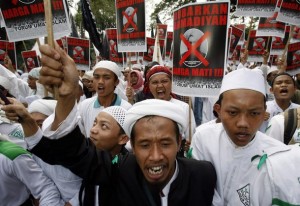by Max Bartels
Impunity Watch Reporter, Oceania Desk
Jakarta, Indonesia
Indonesia has one of the largest Muslim populations in the world; there is now a popular push in the country for religious uniformity among Muslims and a growing intolerance of other religious and even other splinter sects of the Muslim religion. There have now been 264 incidents of religious violence in Indonesia as of 2012 with many more occurring in the past 2 years.

(Photo Curtesy of asianews.it)
Most recently the Indonesian Ahmadiyya sect of Islam has come under attack from Islamists. In the past there have been many violent attacks of the Ahmadiyya communities of Indonesia from mobs and protesters resulting in many deaths. However, the recent problem stems from the Indonesian government who has been slowly restricting the rights of the Ahmadiyya communities. The government has been shutting down Ahmadiyya mosques all over the country citing the need to maintain religious uniformity as the justification for the intrusion.
There has been a growing trend of support form Middle Eastern countries in Indonesia. Countries like Saudi Arabia flow money into religious institutions and schools in Indonesia in an attempt to increase the Islamist sentiment. The current president of Indonesia while not an Islamist himself has appointed many to his council. With support in the government the radical Islamists have had freedom in their acts of repression and the government has passed many decrees against religious minorities and allowed radicals to act violently without repercussion. These decrees have included mandating that every citizen have an identity card, which indicates their religion; these cards have been a source of discrimination for religious minorities.
In the past Indonesia has been proactive about curbing terrorism in the country. The concern for Australia and other western nations is that the growing domestic religious intolerance will lead to intolerance aimed abroad. Indonesia in the past has always prided itself on maintaining a large peaceful Muslim population with little to no radicalization. This increase in violence could bring in or develop radical Islamist and terrorist groups.
It an election year in Indonesia and there and there will be a new government to step in and change the current downward spiral of religious intolerance. Both candidates for the presidency have come out in support of religious tolerance. They realize that without improving conditions for religious minorities in the country that they lose the support of the international community. Both candidates have said that they plan to eliminate regulations and decrees that repress religious minorities and increase education and social welfare in order to tackle the problem.
For more information, please see:
UCA News — Indonesian Election Candidates Promise Religious Tolerance — 19 June 2014
The Guardian — Indonesia’s Growing Religious Intolerance has to be Addressed — 5 February 2014
The Wall Street Journal — Indonesia’a Religious Tolerance Problem — 24 February 2014
